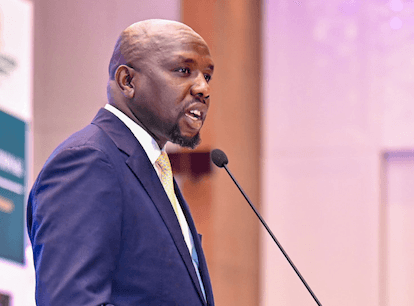Two weeks ago, I sat in a meeting at the Office of the President building on Harambee Avenue. Present were Interior Cabinet Secretary Fred Matiang’i, Director of Public Prosecutions Noodin Haji, Director of Criminal Investigations George Kinoti, Director of the National Counter Terrorism Centre Martin Kimani and police spokesperson Charles Owino, amongst other top national security leaders.
On the opposite side, I represented Haki Africa and sat together with representatives of other human rights groups, including Amnesty International, the International Justice Mission, the Independent Medico Legal Unit (IMLU) and th Kenya National Commission on Human Rights (KNCHR).
The meeting was called to discuss extra-judicial killings and to identify avenues of partnership in dealing with the matter. The CS was categorical that there are no extra-judicial killings in Kenya. He emphasised that extrajudicial killing is when the state officially adopts killing as a form of dealing with an issue.
Since the state of Kenya has no such policy, he said, the killings by police that are reported should not be termed ‘extra-judicial killings’ but ‘killings by rogue police officers’. The CS assured the meeting that his ministry does not and will not tolerate killings of Kenyans by police or any other person.
On Sunday, December 23, 2018, a young man by the name Carilton Maina took his last breath after being felled by a police bullet. Carilton was a bright ‘A’ student who was studying at Leeds University. According to social media reports, he was in Kenya for the December holidays and was expected to return to England to continue with his studies. Unfortunately, because of a Kenyan police officer, he is no more. The depressing fact is that Carilton is one of many youths who have met a similar end this year after being felled by police bullets.
FAKE EVIDENCE
Whether there is an official Kenya police policy to kill suspects or not, one fact is clear — the numbers are alarming! It is not ‘normal’ for so many to be killed. In Mathare, Kayole, Kibera, Eastleigh, Huruma, all in Nairobi, there are chilling stories of how youth were needlessly killed by police.
It is the same in Kisauni, Likoni, Junda and Bamburi, all in Mombasa. In Central as well as Nyanza, the killing of youths is common. Are the security authorities not aware of these killings? If they are aware and the practice persists, does this imply an acceptance of the practise thus a silent policy?
Often whenever a killing is reported, the police authorities choose to side with their killer officers. More often than not, we will hear the police spokesperson or the Inspector General of Police giving a version that depicts the victim as the aggressor, thus justifying the killing. This they do despite the fact that by law, all police killings must be investigated. If the police already have taken sides over a killing, how will they impartially investigate what happened?
The country is awash with episodes of police planting bonokos (fake evidence) on suspects and victims of killings. Growing up in Nairobi in the late ’90s, I witnessed firsthand with my own eyes in Nairobi’s Luthuli Avenue, a police officer shooting an unarmed man who had surrendered and was on his knees asking for forgiveness and to be arrested.
The officer shot the man at point blank range, and in the full glare of onlookers removed a pistol from inside his jacket and planted it on the now lifeless body. He then proceeded to ask onlookers to move away as he shot in the air. Not far back, Kenyans saw openly on social media how a dreaded police officer shot a suspected youth in Eastleigh. No action has been taken against this officer, despite clear video evidence.
The right to life is sacred. Carilton Maina’s lifeless body is lying in the mortuary right now. Many others before him have suffered a similar fate. Whether it is extrajudicial killing or killing by a rogue police officer, what Kenyans want to see is justice. While we follow up to ensure the officer responsible for Carilton’s death is held to account, we also watch with bated breath to see what the authorities, including CS Matiang’i, will do.



















